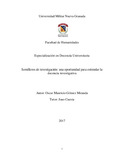Semilleros de investigación: una oportunidad para estimular la docencia investigativa
Online Research Communities: an opportunity to stimulate research in the teaching
Citación
Fecha
2017-03-23Autor
Gómez Miranda, Oscar Mauricio
Título obtenido
Especialista en Docencia Universitaria
Publicador
Universidad Militar Nueva Granada
Palabras claves
; educacion superior - investigaciones; semilleros de investigacion
Metadatos
Mostrar el registro completo del ítem
Documentos PDF
Resumen
El estímulo y la formación de jóvenes investigadores en el contexto de los semilleros, estuvo ausente durante décadas de las funciones misionales en las instituciones de educación superior en Colombia. El semillero de investigación es un ambiente propicio para el impulso del proceso de aprendizaje docente enfocado en la investigación formativa, teniendo como base a los estudiantes de pregrado y a los jóvenes investigadores. Por lo que es deber del docente servir de orientador de los semilleros de investigación, sin tener en cuenta si los estudiantes cuentan dentro de su proyecto de vida con la decisión de realizar investigación, pues los semilleros al fin de cuentas, sirven como complemento al fin universitario de formar personas socialmente responsables y seres humanos moralmente ejemplares. Por tanto el objetivo de este ensayo es identificar a los semilleros de investigación como estrategia pedagógica que estimulan la docencia investigativa. Los semilleros de investigación en Colombia, aparecieron en el año de 1996 en la Universidad de Antioquia como una forma de potencializar la investigación desde las instituciones de educación superior, expandiéndose rápidamente en el país como una estrategia investigativa que involucra a los estudiantes de forma activa. El presente ensayo constituye una revisión documental descriptiva de corte cualitativo. Esta metodología comprendió dos etapas: la primera fue la revisión documental y la segunda comprendió el análisis de contenido. Los resultados permiten establecer que los semilleros de investigación constituyen una estrategia utilizada por las IES como medio de formación investigativa en la Universidad Colombiana, brindando una oportunidad en la potencialización de habilidades tanto de los estudiantes como de los jóvenes investigadores. Donde se crea el ambiente propicio para generar un aprendizaje significativo, a la vez que se desarrollan experiencias investigativas que pueden ser usadas en el progreso de la ciencia.
The encouragement and training of young researchers in the context of seedlings was absent for decades from the missionary functions in higher education institutions in Colombia. The research nursery is an environment conducive to the promotion of the teaching learning process focused on formative research, based on undergraduate students and young researchers. Therefore, it is the duty of the teacher to serve as a guideline for research seedlings, regardless of whether the students count on their life project with the decision to carry out research, since the seedlings at the end of the day serve as a complement to the end To form socially responsible people and morally exemplary human beings. Therefore, the objective of this essay is to identify research seedlings as a pedagogical strategy that stimulate research teaching. Research laboratories in Colombia appeared in the year 1996 at the University of Antioquia as a way of boosting research from higher education institutions, rapidly expanding in the country as a research strategy that involves students actively. The present essay constitutes a qualitative descriptive documentary review. This methodology comprised two stages: the first was the documentary review and the second comprised content analysis. The results allow us to establish that research seedlings constitute a strategy used by IES as a means of research training at the Colombian University, providing an opportunity in the potentialization of skills of both students and young researchers. Where the environment is created conducive to generate a significant learning, while developing research experiences that can be used in the progress of science.
Colecciones
- Docencia Universitaria [691]

